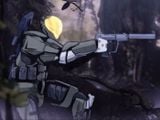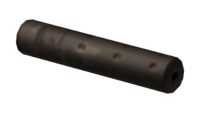Suppressor: Difference between revisions
From Halopedia, the Halo wiki
m (Text replacement - "{{Ref/Sources}} [[" to "{{Ref/Sources}} [[") |
m (Text replacement - "\|(right|thumb)(\|[^\]\n]+)?\|(right|thumb)" to "|thumb$2") |
||
| Line 3: | Line 3: | ||
{{Title|Suppressor}} | {{Title|Suppressor}} | ||
{{Center|For the Forerunner weapon, see [[Z-130 Suppressor]]; for the Forerunner electronic warfare technology, see [[AI suppressor]].}} | {{Center|For the Forerunner weapon, see [[Z-130 Suppressor]]; for the Forerunner electronic warfare technology, see [[AI suppressor]].}} | ||
[[File:Halo 5 Silencer.png| | [[File:Halo 5 Silencer.png|thumb|250px|A suppressor attachment.]] | ||
A '''suppressor''' is a [[Weapon attachment|device attached to a firearm]] to reduce the amount of noise and flash generated by firing the [[weapon]]. It generally takes the form of a cylindrical-shaped metal tube that is attached to the barrel of a firearm, with various internal mechanisms to reduce the sound of firing by slowing the escaping propellant gas, and sometimes by reducing the velocity of the bullet. The point is to keep the user concealed and undetected. Suppressors are also commonly used to help reduce the risk of a weapon's operator or those around them suffering from hearing damage or loss, especially in close quarters combat, in which soldiers will of course typically use firearms while in close proximity to one another. | A '''suppressor''' is a [[Weapon attachment|device attached to a firearm]] to reduce the amount of noise and flash generated by firing the [[weapon]]. It generally takes the form of a cylindrical-shaped metal tube that is attached to the barrel of a firearm, with various internal mechanisms to reduce the sound of firing by slowing the escaping propellant gas, and sometimes by reducing the velocity of the bullet. The point is to keep the user concealed and undetected. Suppressors are also commonly used to help reduce the risk of a weapon's operator or those around them suffering from hearing damage or loss, especially in close quarters combat, in which soldiers will of course typically use firearms while in close proximity to one another. | ||
Revision as of 12:07, April 12, 2023
| There is more information available on this subject at Suppressor on the English Wikipedia. |
A suppressor is a device attached to a firearm to reduce the amount of noise and flash generated by firing the weapon. It generally takes the form of a cylindrical-shaped metal tube that is attached to the barrel of a firearm, with various internal mechanisms to reduce the sound of firing by slowing the escaping propellant gas, and sometimes by reducing the velocity of the bullet. The point is to keep the user concealed and undetected. Suppressors are also commonly used to help reduce the risk of a weapon's operator or those around them suffering from hearing damage or loss, especially in close quarters combat, in which soldiers will of course typically use firearms while in close proximity to one another.
Known suppressors
Usage
A suppressor can be attached to a modified MA5B assault rifle adapted to use one.[1] Suppressors are attached to the end of the M7S Caseless Submachine Guns and M6C/SOCOMs used by the ODSTs.[2]
Trivia
- The suppressor makes its first gameplay appearance in Halo 2 for Windows Vista, and is mentioned in The Art of Halo,[3] on the M7/Caseless Submachine Gun.
- The original plan for the suppressor, which originated around the time of World War II, was to modify the sound of the weapon firing into a different, unrecognizable sound, rather than to reduce the loudness of a discharge, as its name suggests.
- The popular name for the suppressor is "silencer", but this is a misnomer, as sound is still present.
- The suppressor on the M6C/SOCOM cannot be physically found. It is "hidden" inside the compensator.
Gallery
A suppressed M6 sidearm.
A Suppressor in Halo 2 for Windows Vista.
Left side view of the suppressor on the M7S in Halo 3: ODST.
A BR55 with a suppressor in Halo Wars 2.
List of appearances
- Halo: The Fall of Reach (First appearance)
- Halo: First Strike
- Halo 2 for Windows Vista
- Halo Graphic Novel
- Halo: Contact Harvest
- Halo 3: ODST
- Halo Legends
- Halo Evolutions - Essential Tales of the Halo Universe
- Halo 2: Anniversary
- Halo 5: Guardians
- Halo Wars 2
- Halo: Retribution
- Halo: Silent Storm
Sources
- ^ Halo: The Fall of Reach, Chapter 20, page 178 (2001 paperback); page 205 (2010 paperback)
- ^ Halo 3: ODST
- ^ The Art of Halo, page 108




